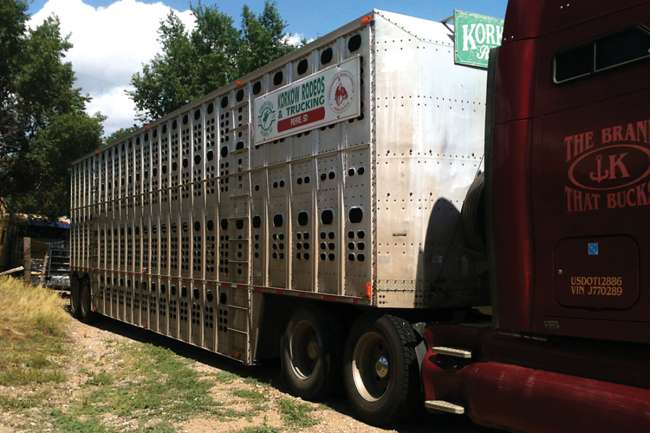Senior Reporter
FMCSA Clarifies ELD Guidance for Horse Haulers

The Federal Motor Carrier Safety Administration has issued a new slate of guidelines to mitigate confusion over whether livestock haulers, including those who transport their horses, are required to install electronic logging devices on their trucks or possess a commercial driver license.
The new guidelines, quietly posted on the agency’s website on Feb. 24, will go a long way to address an industrywide “sense of confusion” among horse haulers, one of agriculture’s most concerned segments over the new ELD rule that went in effect Dec. 18, said Cliff Williamson, director of health and regulatory affairs for the Washington-based American Horse Council.
“It certainly was a good sign,” Williamson told Transport Topics. “We appreciated the attention our industry was given. There are still concerns and confusion, so the fight will continue on.”
AGRICULTURAL EXCEPTIONS WEBSITE | FACT SHEET
For roughly 30 years, many horse owners who transport their horses to rodeos, races, competitions and recreational sectors have largely traveled under law enforcement’s radar when it comes to hours of service and driver licensing requirements, Williamson said.
The new guidelines provide an ELD and CDL exception for the transportation of horses and other animals to shows and events, as well as cars, boats and other similar items.
“In these cases, when the transportation in question is not business related (neither for compensation, nor where the driver is engaged in an underlying business related to the move), none of the regulatory requirements apply, even if prize or scholarship money is offered,” the “agricultural exceptions and exemptions” document said. “This includes the hours-of-service regulations, requirements for electronic logging devices and CDL regulations, unless required by the driver’s home state.”
The document said that employers and drivers who transport horses and other animals to shows and events, as well as cars, boats and other similar items, in a vehicle that has a gross weight of 26,001 pounds or more — or the vehicle is a combination of vehicles (truck and trailer) with a gross weight of 26,001 pounds or more, inclusive of a towed unit with a GVW of more than 10,000 pounds — must comply with the licensing requirements with their state, which may or may not require a CDL.
Earlier this month, representatives of the horse industry got some of their questions answered with a visit to the Department of Transportation, but an industrywide “sense of confusion” has remained, particularly whether horse haulers will need a CDL, Williamson told TT.
Council officials have said the ELD deadline has sparked an animated discussion within the horse industry.
That discussion was outlined in a Jan. 28 AHC letter to Transportation Secretary Elaine Chao, which noted there are “growing concerns and confusion” among the group’s members regarding commercial driver and vehicle regulations.
“There is considerable frustration within the agricultural community, and specifically within the equine sector, regarding the scope, intent and ramifications of existing regulations and subsequent enforcement of commercial drivers and commercial motor vehicles,” the letter said.
The horse industry has an annual $102 billion impact on the U.S. economy, supports 1.4 million jobs and about 27 million people will ride a horse annually, according to a study commissioned by the group.
“The majority of these individuals do not transport horses as part of a business, and yet many of them fear that enforcement will begin targeting them specifically because of the vehicle they drive or the destination of their trip,” the group said in a recent statement.
Jon Samson, executive director of American Trucking Associations’ Agricultural & Food Transporters Conference, agreed that some issues for the conference’s livestock haulers, which includes the horse industry, were unclear, ambiguous and awaiting the guidance document.
“Enforcement officials are starting to ding these guys,” Samson said. “Before they wouldn’t have to have CDLs and log their hours, but now there’s a potential that they should have them — at least some class of CDL.”
Samson added, “There is additional enforcement that’s going to take place, and depending on how they clarify the guidance, people that may have been operating without a certain level of CDL may actually have to go out and get one. And then there will be quite a few people that are getting dinged that perhaps shouldn’t be.”
Collin Mooney, executive director of the Commercial Vehicle Safety Alliance, said that his organization requested the information be created for the industry due to all the positive and negative comments it has received within the agriculture community.
“I think there’s a lot of misinformation that is circulating,” Mooney said. “There’s more to come as additional questions come in.”
In a statement, FMCSA said it has designed a website that is devoted to agricultural operations, including the transportation of agricultural commodities’ exemptions and ELD exemptions. The agency said it will update the site and that it encourages stakeholders to sign up for the updates and alerts regarding agricultural operations information here.


